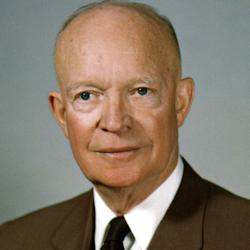President Eisenhower's Heart Attacks
President Eisenhower suffered his first heart attack in 1955. The most eminent heart specialist in the USA was assigned to his care, Dr Paul Dudley White.
![]() Prof. Ancel Keys, of the University of Minnesota, took the opportunity to tell the nation that everybody should be eating a low-fat, low-cholesterol diet. Cholesterol was part of the hardened deposits (plaques) in the artery walls of people with atherosclerosis. Since animal fats, particularly saturated fats contained cholesterol, Keys connected the dots without any experimental evidence to back his assertions.
Prof. Ancel Keys, of the University of Minnesota, took the opportunity to tell the nation that everybody should be eating a low-fat, low-cholesterol diet. Cholesterol was part of the hardened deposits (plaques) in the artery walls of people with atherosclerosis. Since animal fats, particularly saturated fats contained cholesterol, Keys connected the dots without any experimental evidence to back his assertions.
 Eisenhower war a heavy smoker, of normal weight, with normal total cholesterol. In that time, smoking was very common and was not seen as a possible problem.
Eisenhower war a heavy smoker, of normal weight, with normal total cholesterol. In that time, smoking was very common and was not seen as a possible problem.
Eisenhower was advised to eat fewer saturated fats and limit ![]() dietary cholesterol. He did exactly as he was told, but his weight increased, and his total cholesterol went up. A military man who prided himself on self-discipline, Eisenhower tried to do better. Once again, the result was worse.
dietary cholesterol. He did exactly as he was told, but his weight increased, and his total cholesterol went up. A military man who prided himself on self-discipline, Eisenhower tried to do better. Once again, the result was worse.
Over the next 13 years, there were 6 more heart attacks.
Eisenhower suffered persistent problems with his digestive system.
He died in 1969 of a heart attack.
By this time, the research community thought they understood what caused heart attacks and how to lessen the risk. They thought that people needed to make several changes in lifestyle, to reduce the incidence of heart disease. You will be familiar with these. They are still commonly recommended. The 1970's version of a "heart safe" programme was a Low-fat diet, more exercise, blood pressure control, to cease smoking, and reduce total cholesterol. The study of this programme was called ![]() The Multiple Risk Factor Intervention Trial. Before you click that link, ask yourself how that trial turned out?
The Multiple Risk Factor Intervention Trial. Before you click that link, ask yourself how that trial turned out?
At the same time, another group began a study to see if lowering total cholesterol with a drug,"cholestyramine" was effective when combined with a low-fat diet. The result was positive, but insignificantly so. Dr Philip Handler chairperson of the Food and Nutrition Board in 1980 said, "However tenuous the linkage, and however disappointing the various intervention trials, it seemed prudent to propose ..." He goes on to confirm acceptance of the low-fat diet and reduced cholesterol recommendation. He concludes his statement saying, "Resolution of this dilemma turns on a value judgment. The dilemma posed is not a scientific question; it is a question of ethics, morals and politics. Those who argue either position strongly, are expressing their values; they are not making scientific judgments."
For the next thirty years that was the basis for public policy on the recommended diet, and how to reduce the risk of heart disease.
